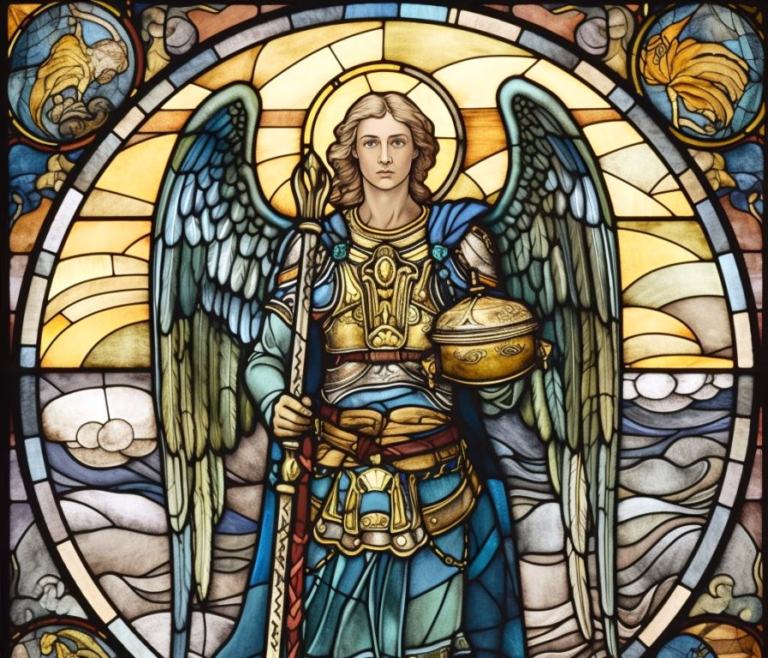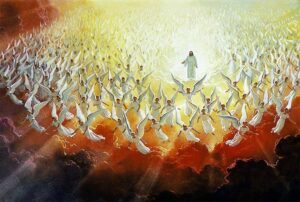Table of Contents
Who is Archangel?
An archangel holds a distinguished position in various religious traditions, signifying a high-ranking angel with specific responsibilities and significant roles in the celestial hierarchy. The term “archangel” originates from Greek words: “archē,” meaning “first” or “chief,” and “angelos,” meaning “messenger” or “angel.” Consequently, an archangel can be understood as a chief or principal messenger.
Key Points about Archangels
High Rank: Archangels rank among the highest orders of angels, possessing greater power and authority than their celestial counterparts.
Messenger Role: The name itself implies a role as messengers or intermediaries between the divine and the earthly realm. Archangels are often associated with delivering important messages, guidance, or revelations from a higher power.
Protective Functions: Archangels are frequently depicted as protectors, guardians, and warriors against malevolent forces, often invoked for spiritual protection and assistance.
Specific Roles: In different religious traditions, specific archangels may have distinct roles. For instance, in Christianity, Michael is associated with protection and leading heavenly armies, while Gabriel is known as a messenger delivering significant announcements.
Variation Across Traditions: Although the concept of archangels is closely associated with Christianity, similar celestial beings are recognized in Judaism and Islam. The terminology might differ, but powerful angels with analogous functions are acknowledged.
What Does Archangel Mean?
The term “archangel” originates from Greek words. The Greek word “archangelos” (ἀρχάγγελος) combines “archē” (ἀρχή), meaning “first” or “chief,” and “angelos” (ἄγγελος), meaning “messenger” or “angel.” Consequently, the literal meaning of “archangel” is “chief messenger” or “chief angel.”
In various religious traditions, archangels are high-ranking angels with specific roles in the celestial hierarchy, serving as messengers or agents of divine will, delivering important messages, protecting individuals or nations, and executing tasks in line with the divine plan.
Purpose of Archangels
The purpose of archangels is closely tied to their roles as messengers or agents of divine will across various belief systems. Key aspects of their purpose include:
Messengers of God: Archangels are seen as messengers delivering important messages or revelations from the divine to humans. For example, Gabriel in Christianity announces the birth of Jesus to the Virgin Mary.
Protectors and Guardians: Archangels are associated with protection and guardianship, often depicted as defenders against evil forces, providing spiritual protection to individuals and communities.
Guides and Intercessors: Some traditions view archangels as guides, assisting individuals on their spiritual journeys and interceding on their behalf during times of need.
Overseeing Cosmic Functions: Archangels may be assigned specific roles in cosmic order, overseeing elements of nature, time, or specific nations in certain religious cosmologies.
Judgment and Eschatological Roles: In some belief systems, archangels play roles in the judgment of souls and events surrounding the end times, with Michael often associated with eschatological roles in Christian theology.
Facilitators of Worship: Archangels may be invoked in religious rituals and worship practices, enhancing believers’ connection with the divine or facilitating their prayers.
Archangel Origins
The concept of archangels finds its roots in various religious traditions, with variations in interpretations. A brief overview of archangel origins in Christianity, Judaism, and Islam includes:
Christianity:
The Bible mentions angels, and archangels hold a high rank among them. Michael is often referred to as the chief archangel, associated with protection and leadership.
Judaism:
References to powerful angels exist, with Michael and Gabriel prominent in Jewish angelology, fulfilling roles such as protectors and messengers.
Islam:
Angels play a significant role in Islam, with Jibril (Gabriel) delivering revelations to prophets and Mikail (Michael) associated with providing sustenance.
Legends and Stories
Legends and stories about archangels, such as Gabriel and Raphael, are prevalent in various religious traditions:
Archangel Gabriel:
Annunciation to Mary (Christianity): Gabriel’s announcement to the Virgin Mary about the birth of Jesus.
Messenger and Revelator (Islam): Gabriel’s crucial role as the messenger between God and prophets in Islam.
Angel of Destruction (Judaism and Islam): Associations with roles involving destruction or divine wrath in some traditions.
Archangel Raphael:
Healing of Tobit (Judaism and Christianity): Raphael’s central role in healing Tobit’s blindness and aiding Tobit’s son, Tobiah.
Healing Angel (Judaism and Christianity): Raphael’s association with healing in Jewish and Christian traditions.
Tobit’s Gratitude (Judaism and Christianity): Raphael instructing Tobit and Tobiah to praise and thank God after revealing his identity.
Archangel Family
In angelology, the concept of an “archangel family” is not explicitly defined. Different religious traditions provide insights into relationships and hierarchical structures among angels, including archangels. Christian, Jewish, and Islamic perspectives offer an overview of archangels and their roles.
Archangels Symbology
Archangels are often symbolized by specific symbols representing their attributes or roles:
Archangel Michael:

Sword and Shield: Representing Michael’s role as a warrior and protector.
Armor: Emphasizing Michael’s celestial protection.
Scales of Justice: Symbolizing Michael’s involvement in the weighing of souls during judgment.
Archangel Gabriel:
Trumpet: Representing Gabriel’s role in announcing important messages.
Lily or Lily Staff: Symbolizing purity and associations with the Virgin Mary.
Archangel Raphael:
Staff and Traveler’s Attire: Emphasizing Raphael’s role as a guide and healer.
Fish: A symbol of healing associated with Raphael’s advice to Tobias.
Archangel Uriel:
Book or Scroll: Symbolizing Uriel’s association with wisdom and knowledge.
Flaming Sword: Representing the purifying and enlightening power of divine knowledge.
Archangel Jophiel:
Flaming Sword or Light: Symbolizing Jophiel’s association with enlightenment.
Yellow or Gold: Representing wisdom, joy, and spiritual understanding.
Conclusion
Archangels hold a prominent and revered status in various religious traditions, serving as messengers, protectors, and agents of divine will. Across Christianity, Judaism, and Islam, archangels such as Michael, Gabriel, and Raphael play crucial roles in delivering messages, offering protection, and embodying specific virtues. The symbols associated with archangels reflect their attributes, with swords, trumpets, and healing symbols illustrating their diverse functions. While the concept of an “archangel family” lacks explicit definition, the hierarchical organization of these celestial beings contributes to the rich tapestry of religious narratives. Archangels symbolize a connection between the divine and the earthly realm, embodying wisdom, protection, and enlightenment in the spiritual journey of believers across different cultures and traditions.
Archangel FAQ
Who is Michael the Archangel?
Michael is often recognized as an archangel in Christianity, Judaism, and Islam. In Christian tradition, he is viewed as a warrior and protector.
What does Archangel Michael look like?
Descriptions of Archangel Michael's appearance vary, but he is often depicted as a powerful and majestic figure, sometimes with armor, a sword, and wings.
What does Archangel mean?
"Archangel" combines "arch," meaning chief or principal, with "angel," indicating a high-ranking celestial being. Therefore, an archangel is a chief or leading angel.
Who is the Supreme Archangel?
The concept of a supreme archangel varies among religious traditions. In Christianity, Michael is often considered a prominent archangel, but the idea of a supreme archangel is not universally agreed upon.
Who is Archangel Gabriel?
Archangel Gabriel is another prominent figure in various religious traditions, often recognized as a messenger. In Christianity, Gabriel is known for announcing important events, including the birth of Jesus.
What is an Archangel in the Bible?
The term "archangel" is found in the Bible, but specific details about archangels and their hierarchy are not extensively elaborated. Michael is the only angel explicitly called an archangel in the New Testament (Jude 1:9). The Bible doesn't provide exhaustive descriptions of their roles or appearances.




